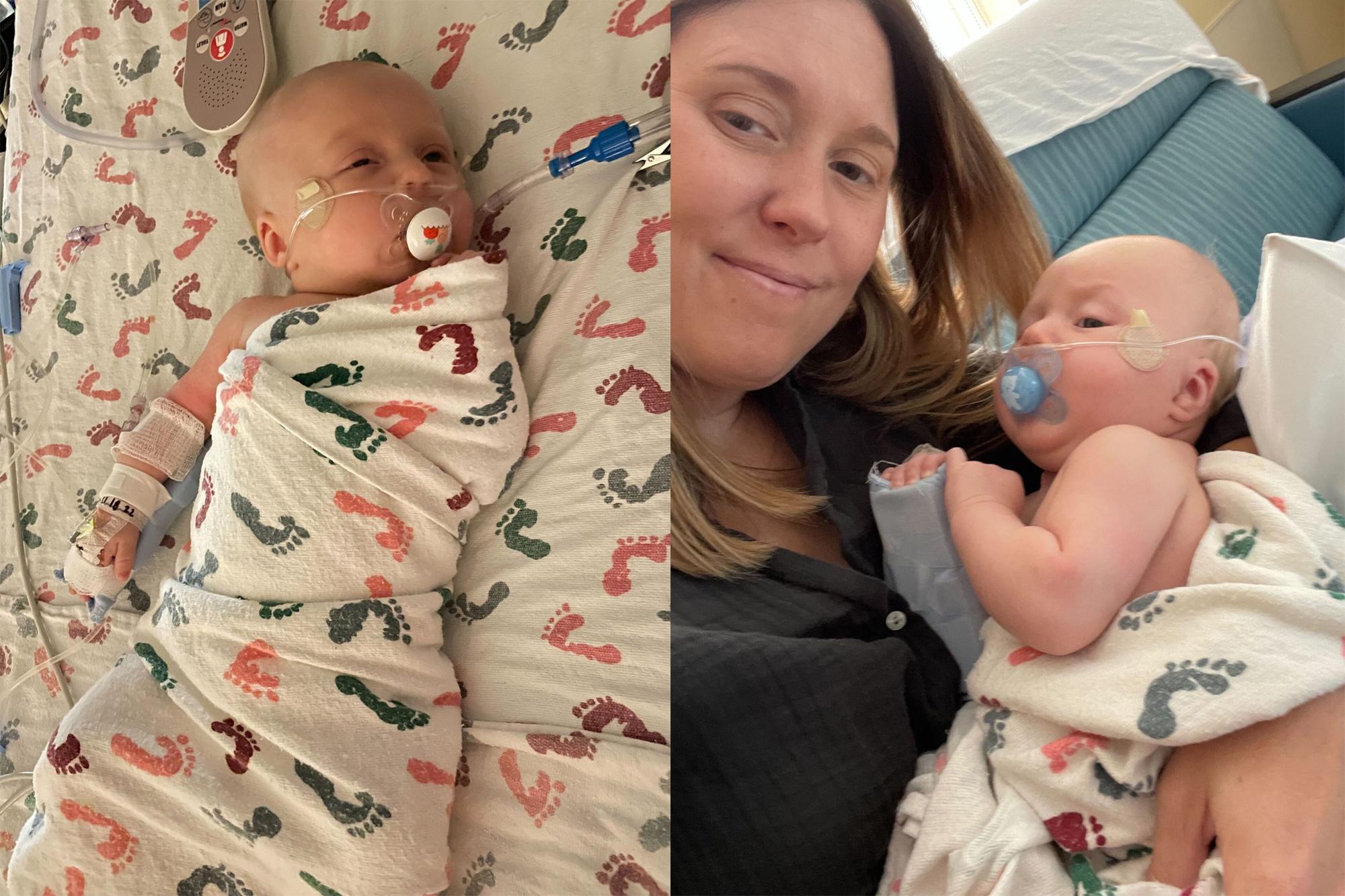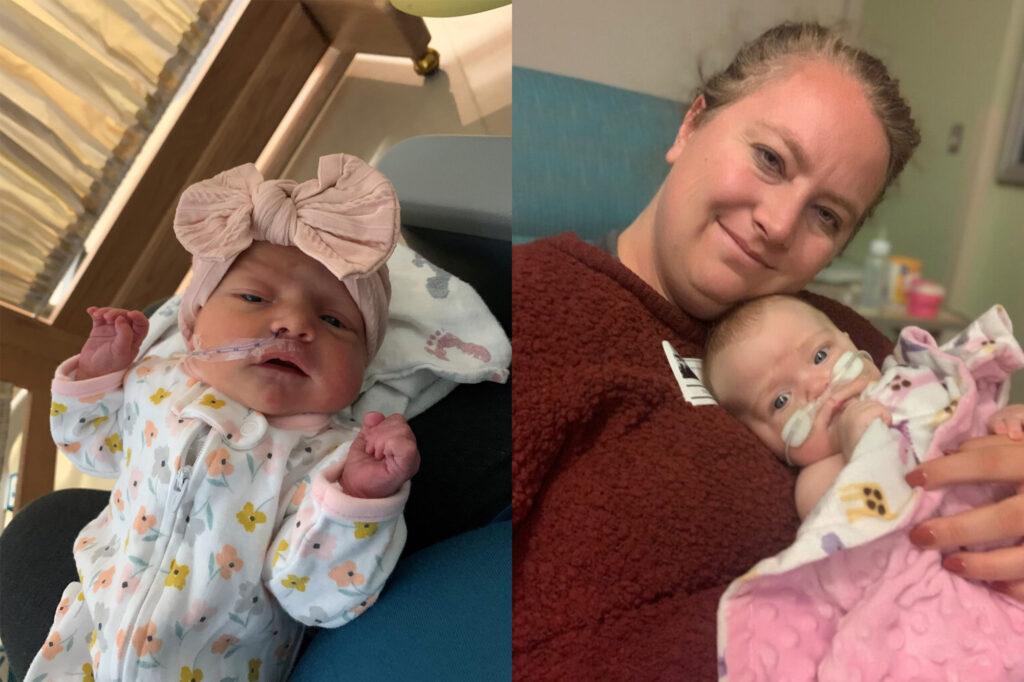
Colorado's severe respiratory season continues to hit hard, especially among young kids. Parents of children hospitalized with RSV report that facilities are packed, but that their infant got critical care — and just when they needed it.
Denver mom Lani Young said her 2-month-old, Malcolm, got RSV last week. She said she and her husband Travis consulted with her doctor, first via tele-visit and then in person after Malcolm's breathing became labored. She described the little guy’s stomach sort of sucking in under his ribs as he tried to breathe.
“He just kept getting worse, just the amount of effort he was putting in to breathe was really obvious, and you know, for just such a tiny little baby, it was really stressful to watch,” Young said.
Malcolm’s case is just one of hundreds as Colorado battles what has been described as an unprecedented early and severe RSV season. It comes with a rise in cases of flu and COVID-19, especially in adults, and after the state has grappled with two consecutive tough winter coronavirus waves during the pandemic.
'I was so glad to be at the hospital'
Malcolm’s 2-year-old sister, Tenny, is in daycare and had been dealing with colds this fall but nothing too serious. But Young suspects that’s how the bug originally got introduced to their home.
Malcolm was admitted to a Rocky Mountain Hospital for Children in Denver on Thursday. Young admits at moments it did feel scary, though she was confident her son was in good hands.
“I was so glad to be at the hospital,” she said. “It was just, you know, he's tiny in this bed,” hooked up to an IV, along with a “really intense oxygen machine.”
She said Malcolm had a pulse sock on his foot and had monitors on his belly, “so he is like completely hooked up to all these cords. Luckily I was still able to hold him. But you know, there's beeping. The nurses and doctors are very calm, but you can tell there's just like a real heightened level of urgency and attention around him.”
Malcolm was put on pressurized oxygen.
“We basically maxed out the machine, so they said if he doesn't respond to this and some of our other interventions we'll have to send him over to intensive care.” His providers “had to keep upping, upping, upping” the amount of oxygen.
Then, Malcolm stabilized in the night, and seemed to have turned the corner by the next morning.
Malcom got steadily better and was released a few days later, on Sunday.
Their story comes as the state health department and pediatric hospitals report patient capacity is tight, but they are still fully able to help kids and families.
No major letup in sight for RSV in children
Children’s Hospital Colorado, the state’s largest pediatric facility, is at “100 percent capacity” with all its units and emergency department extremely busy, said Dr. Kevin Carney, the associate chief medical officer. He did note a glimmer of progress.
“We are seeing some hints of hope in that we think we have probably peaked in terms of our RSV numbers,” he said. “They continue to still be really, really elevated, but the rate with which they were increasing before has really slowed.”
But he said he didn’t expect things to significantly ease up for weeks.
“We can certainly hope for the best that we may get a little bit of a reprieve, but I think for the most part right now we're expecting this just to continue on through into the New Year,” Carney said.
In a briefing with reporters, state officials said the five-country metro Denver area had recorded 895 RSV hospitalizations, the vast majority in children, with 255 school and children care outbreaks statewide, plus two outbreaks in residential care facilities.
In addition, the state is also managing 379 COVID-19 hospitalizations and 164 for influenza, mostly in adults.
Dr. Rachel Herlihy, the state epidemiologist, underscored what the state has been seeing for weeks, “a much earlier than usual RSV season and much higher numbers of hospitalizations than we typically see for RSV, so certainly a severe RSV season this year.”
Herlihy noted that she too had a respiratory infection in the last week, and is feeling better.
Last week, the office of Gov. Jared Polis said he’d tested positive for COVID-19, though he is vaccinated and is asymptomatic. In a release, a spokesman said he has been testing regularly due to a known exposure and would work from home with his full schedule until he is no longer contagious, i.e. for five days if he remained asymptomatic.
Hospital bed capacity, especially for kids, remains precariously tight, said Scott Bookman, who directs the Division of Disease Control and Public Health Response for the health department.
He presented a slide showing just two pediatric ICU beds available in the entire state. But he noted hospital systems were working together closely and “expanding capacity in every way possible.” Also, beds open up as other patients improve and are discharged.
The expansion efforts include hospitals that mostly serve adults offering support to pediatric centers and coordinating and moving patients where needed. Still, “there is extreme stress in the pediatric ICU capacity in the state of Colorado right now,” he said.

'I didn't want to go home because I knew that she needed help'
Another mother of an RSV patient, Brianne Price from Littleton, can attest to that.
She said her daughter Lily, almost 6 months old, recently came down with a cough and then had labored breathing. Price says she and her husband, who is a paramedic, took Lily to Children's Hospital Colorado.
“She was bobbing her head and then breathing in her belly area,” Price said. “It was a big thing that the nurses taught me that if she's like breathing into her ribs in her belly area, it's kinda hard to explain, but those are the biggest signs that we knew that her breathing was labored.”
They first took her to Children’s Hospital's south campus, in Highlands Ranch, where she was seen, went back home and then returned when Lily’s symptoms worsened.
“It was pretty packed. We ended up waiting for three hours, which isn't as long as some other people, but we were triaged in the waiting room,” she said.
With the south campus full, Lily was taken by ambulance to the main campus in Aurora and put on oxygen.
“I just always knew that she was in the right place, like, I didn't wanna be home with her. I didn't want to go home because I knew that she needed help,” Price said.
Like Malcolm, Lily had a night in the hospital with labored breathing, but then gradually bounced back and showed signs of improvement.
“It was nice having the nurses checking in on her and making sure that she was breathing well and not having that labored breathing,” Price said. We really appreciated the doctors just asking our opinion too on how to make sure or if we felt like we were confident to go home.”
“I was just thankful that we were in a place that was going to take really good care of Lily,” she said.
Lily was hospitalized for four days, and when she was released didn’t need supplemental oxygen at home.
Mask up, wash your hands, avoid large crowds — and talk about it
Meantime, with the holiday season approaching and Thanksgiving this week, Carney urged families to avoid spreading illness to others and to discuss it explicitly before gathering.
He urged having conversations with people you’re getting together with, discussing who may be sick and who is at a higher risk for more severe infections.
He said masking, washing hands and avoiding large crowds and indoor spaces can help, Carney said.
“But also taking the opportunity to talk with your family and friends and saying, ‘hey, we know there's a lot going on this year, let us know if any of your kids have runny noses, coughs, a little fever.’”
“While it may be mild at the outset, this is how it starts. And if there are people in your families who are more likely to get severe disease from some of these infections, I think it's way better to talk about that in advance than waiting to see what happens afterwards,” Carney said.
“There's lots of things that we've learned about gathering before the holidays that are important,” said Herlihy, noting that one strategy is to test folks who are going to be together, especially if someone in the group is at higher risk.
“We have learned that masks are a really important strategy, especially when you're going to have contact with individuals that are at higher risk or when you're going to be in a crowded indoor environment,” she said.









